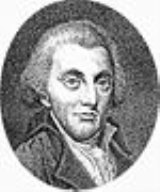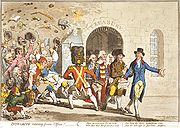
United Kingdom general election, 1801
Encyclopedia

United Kingdom of Great Britain and Ireland
The United Kingdom of Great Britain and Ireland was the formal name of the United Kingdom during the period when what is now the Republic of Ireland formed a part of it....
on 1 January 1801. The First Parliament of the United Kingdom was composed of members of the former Parliaments of the Kingdom of Great Britain
Kingdom of Great Britain
The former Kingdom of Great Britain, sometimes described as the 'United Kingdom of Great Britain', That the Two Kingdoms of Scotland and England, shall upon the 1st May next ensuing the date hereof, and forever after, be United into One Kingdom by the Name of GREAT BRITAIN. was a sovereign...
and the Kingdom of Ireland
Kingdom of Ireland
The Kingdom of Ireland refers to the country of Ireland in the period between the proclamation of Henry VIII as King of Ireland by the Crown of Ireland Act 1542 and the Act of Union in 1800. It replaced the Lordship of Ireland, which had been created in 1171...
.
The Parliament of Great Britain
Parliament of Great Britain
The Parliament of Great Britain was formed in 1707 following the ratification of the Acts of Union by both the Parliament of England and Parliament of Scotland...
held its last general election in 1796
British general election, 1796
The British general election, 1796 returned members to serve in the 18th and last House of Commons of the Parliament of Great Britain to be held before the formation of the United Kingdom of Great Britain and Ireland on 1 January 1801...
and last met on 5 November 1800. The final election for the Parliament of Ireland
Parliament of Ireland
The Parliament of Ireland was a legislature that existed in Dublin from 1297 until 1800. In its early mediaeval period during the Lordship of Ireland it consisted of either two or three chambers: the House of Commons, elected by a very restricted suffrage, the House of Lords in which the lords...
took place in 1797.
By a proclamation dated 5 November 1800 the members of the new united Parliament were summoned to first meet on 22 January 1801. At the outset, the Tories led by Addington
Henry Addington, 1st Viscount Sidmouth
Henry Addington, 1st Viscount Sidmouth, PC was a British statesman, and Prime Minister of the United Kingdom from 1801 to 1804....
enjoyed a majority of 108 in the House of Commons.
Political situation
Great Britain had been at war with France since 1792. The Prime Minister since 1783, William Pitt the YoungerWilliam Pitt the Younger
William Pitt the Younger was a British politician of the late 18th and early 19th centuries. He became the youngest Prime Minister in 1783 at the age of 24 . He left office in 1801, but was Prime Minister again from 1804 until his death in 1806...
, led a broad wartime coalition of Whig and Tory politicians.
The principal opposition to Pitt was a relatively weak faction of Whigs, led by Charles James Fox
Charles James Fox
Charles James Fox PC , styled The Honourable from 1762, was a prominent British Whig statesman whose parliamentary career spanned thirty-eight years of the late 18th and early 19th centuries and who was particularly noted for being the arch-rival of William Pitt the Younger...
. For four years after 1797 opposition attendance at Westminster had been sporadic as Fox pursued a strategy of secession from Parliament. Only a small group, led by George Tierney
George Tierney
George Tierney PC was an English Whig politician.-Background and education:Born in Gibraltar, Tierney was the son of Thomas Tierney, a wealthy Irish merchant of London, who was living in Gibraltar as prize agent. He was sent to Eton and Peterhouse, Cambridge, where he took the degree of Law in 1784...
, had attended frequently to oppose the ministers. As Foord observes "only once did the minority reach seventy-five, and it was often less than ten".
The Act of Union 1800
Act of Union 1800
The Acts of Union 1800 describe two complementary Acts, namely:* the Union with Ireland Act 1800 , an Act of the Parliament of Great Britain, and...
created the United Kingdom, by merging the previous Kingdoms of Great Britain and Ireland. The first Parliament of the United Kingdom was composed of all the members of the last Parliament of Great Britain and some of the members of the final Parliament of Ireland.
Pitt wished to grant Catholic emancipation
Catholic Emancipation
Catholic emancipation or Catholic relief was a process in Great Britain and Ireland in the late 18th century and early 19th century which involved reducing and removing many of the restrictions on Roman Catholics which had been introduced by the Act of Uniformity, the Test Acts and the penal laws...
(the right for Roman Catholics to sit in Parliament), to help reconcile the Irish Catholic majority with the Union. King George III
George III of the United Kingdom
George III was King of Great Britain and King of Ireland from 25 October 1760 until the union of these two countries on 1 January 1801, after which he was King of the United Kingdom of Great Britain and Ireland until his death...
was opposed to that policy, so Pitt was compelled to resign in March 1801.
The new Tory Prime Minister was Henry Addington. He led another war time administration of pro-government Whigs and Tories. This was however weaker than Pitt's Ministry as Pitt and his faction did not join the new government.
The younger opposition Whigs also became more involved in Parliamentary opposition. Charles Grey
Charles Grey, 2nd Earl Grey
Charles Grey, 2nd Earl Grey, KG, PC , known as Viscount Howick between 1806 and 1807, was Prime Minister of the United Kingdom of Great Britain and Ireland from 22 November 1830 to 16 July 1834. A member of the Whig Party, he backed significant reform of the British government and was among the...
, on 25 March 1801 tried to persuade the House of Commons to set up a Committee on the State of the Nation. His motion was lost, but it attracted 105 supporters. The Foxite
Foxite
The term Foxite generally refers to an 18th or 19th century British Whig politician who adhered to the ideals and political beliefs of Charles James Fox, the 18th century member of parliament and leader of the Whig party....
leaders gradually ended their secession from Parliament.
Pitt was generally supportive of the Addington Ministry, but was semi-detached from it. As the well known couplet tellingly observed "Pitt is to Addington, as London is to Paddington", which indicates the contemporary view of the relative abilities of the two Prime Ministers.
Dates of co-option
All British MPsMember of Parliament
A Member of Parliament is a representative of the voters to a :parliament. In many countries with bicameral parliaments, the term applies specifically to members of the lower house, as upper houses often have a different title, such as senate, and thus also have different titles for its members,...
and those Irish members representing constituencies which retained two members after the Union (the thirty-two Irish counties and the cities of Dublin and Cork
Cork (city)
Cork is the second largest city in the Republic of Ireland and the island of Ireland's third most populous city. It is the principal city and administrative centre of County Cork and the largest city in the province of Munster. Cork has a population of 119,418, while the addition of the suburban...
) automatically retained their seats when the Union took effect on 1 January 1801.
Those members of the Irish House of Commons to sit at Westminster, who represented constituencies still enfranchised after the Union but reduced from two members to one (the remaining thirty one most considerable Irish boroughs and Dublin University), were selected by drawing lots. If one of the seats in the Irish Parliament was vacant, then the remaining member for the constituency was automatically chosen for the Westminster Parliament. If both seats were vacant a by-election was held.
Summary of the constituencies
Key to categories in the following tables: BC - Borough/Burgh constituencies, CC - County constituencies, UC - University constituencies, Total C - Total constituencies, BMP - Borough/Burgh Members of Parliament, CMP - County Members of Parliament, UMP - University Members of Parliament.Monmouthshire
Monmouthshire (historic)
Monmouthshire , also known as the County of Monmouth , is one of thirteen ancient counties of Wales and a former administrative county....
(1 County constituency with 2 MPs and one single member Borough constituency) is included in Wales in these tables. Sources for this period may include the county in England.
Table 1: Constituencies and MPs, by type and country
| Country | BC | CC | UC | Total C | BMP | CMP | UMP | Total MPs |
|---|---|---|---|---|---|---|---|---|
| England | 202 | 39 | 2 | 243 | 404 | 78 | 4 | 486 |
| Wales | 13 | 13 | 0 | 26 | 13 | 14 | 0 | 27 |
| Scotland | 15 | 30 | 0 | 45 | 15 | 30 | 0 | 45 |
| Ireland | 33 | 32 | 1 | 66 | 35 | 64 | 1 | 100 |
| Total | 263 | 114 | 3 | 380 | 467 | 176 | 5 | 658 |
Table 2: Number of seats per constituency, by type and country
| Country | BCx1 | BCx2 | BCx4 | CCx1 | CCx2 | UCx1 | UCx2 | Total C |
|---|---|---|---|---|---|---|---|---|
| England | 4 | 196 | 2 | 0 | 39 | 0 | 2 | 243 |
| Wales | 13 | 0 | 0 | 12 | 1 | 0 | 0 | 26 |
| Scotland | 15 | 0 | 0 | 30 | 0 | 0 | 0 | 45 |
| Ireland | 31 | 2 | 0 | 0 | 32 | 1 | 0 | 66 |
| Total | 63 | 198 | 2 | 42 | 72 | 1 | 2 | 380 |
See also
- United Kingdom general electionsUnited Kingdom general electionsThis is a list of United Kingdom general elections since the first in 1802. The members of the 1801–1802 Parliament had been elected to the former Parliament of Great Britain and Parliament of Ireland, before being co-opted to serve in the first Parliament of the United Kingdom, so that Parliament...
- Members of the 1st UK Parliament from IrelandMembers of the 1st UK Parliament from IrelandThis is a list of the Irish MPs who were co-opted from the former Parliament of Ireland, to serve as Members of the 1st UK Parliament from Ireland, or who were elected at subsequent by-elections...

